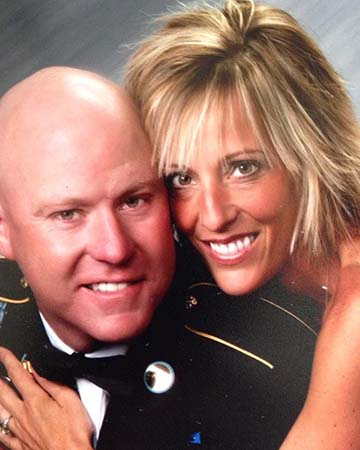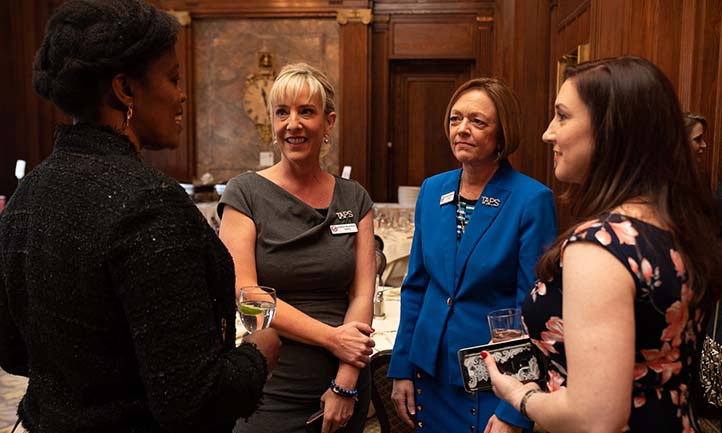From Caregiver to Survivor: Finding New Purpose and Honoring Husband's Legacy
Author: Coleen Bowman
Editor's note: The TAPS Caregiver to Survivor program provides comfort and care to families whose military loved ones died following an illness. In 2019 alone, TAPS welcomed 2,000 survivors who experienced such a loss. We have developed our new program to focus on the complex nature of this grief, which often begins at the time of diagnosis. We are here for all those who grieve an illness loss, including those resulting from COVID-19.
In June 2011 we got the devastating news. My husband, Rob, at the age of 42 was diagnosed with a very rare and aggressive form of cancer, cholangiocarcinoma (bile duct cancer). In a moment, our world was turned upside down. With three daughters at home, ranging from ages 8 to 16, we were faced with the biggest challenge of our lives.
Rob started his treatment, which was twice a week, and we tried to establish a “new normal.” I went from being an Army wife of a big, strong man who jumped out of airplanes for fun and led recon platoons into some of the bloodiest battlefields in Iraq, to a wife of a cancer patient who was unsure of what that even meant.

There was a stigma that came with Rob’s diagnosis. Our Army friends began to keep their distance, like we were the plague — the same way you start to create distance when you are about to PCS. It’s a matter of self-preservation, something I had done many times in the 18 years I had been an Army wife. Our lives now included chemo treatments, blood tests, shots (I learned to do this at home, to save a trip to the doctor). In January of 2012, I had to rush my husband to the ER as he began to spike a fever. The emotions of losing him were too much to handle. I just stood as strong as I could and prayed he would make it through, and he did. That time.
About one week after his diagnosis I gathered up the courage to “Google” his cancer. I was devastated. I realized we needed a miracle. That is the day I started grieving the imminent death of my husband, the man I had been married to for 18 years, the father of my daughters, Katie, Kellie and Cameron. My grief journey began 19 months before he died.
Numbness, Relief, and Guilt
On January 13, 2013, my husband passed away. He was 44 years old. At the moment of his death, I went numb. I was in absolute shock, and felt a wave of sadness wash over me, and then the next feeling I had was relief: relief that he was no longer suffering, relief that we could start trying to pick up the pieces of our lives. Then, I felt guilt for that relief. I thought, “My gosh, how can you be relieved? He is gone, my girls won’t have their Dad to walk them down the aisle on their wedding day.”
That guilt would not go away until years after his death. I had guilt for being the one who gave him his pain medication in the last hours of his life. I worried that I had given him too much, that maybe he would still be alive if I had kept him in the hospital, instead of at home where he chose to die.
After Rob died, I spent the first 6 – 8 months just going through the motions, looking for the new me. I had gone from an Army wife of a sergeant major to not even being someone’s wife. I had to find my way alone, and I had to completely rebuild my life. I was 21 years old when I married Rob, and I was 41 when he died. That life was all I knew.
When the holidays came around each year, I had to let go of many traditions we had because they were too painful to continue. There were many tears and lack of understanding initially. We have held onto a few, but I needed to create a life for me and the girls that didn’t include Rob on a daily basis. He comes forward with us, but he is in his lane and we are in ours.

Finding a New Purpose and Identity
We buried our hero on April 3, 2013, in Section 60 in Arlington National Cemetery. I clearly remember as we were flying back to the West Coast, I looked out the window of the airplane and saw Arlington. I knew at that moment I needed to go “home,” pack up the necessities that would be needed for a small apartment near Rob. I knew I wanted to honor him and the legacy he left behind, and I knew where that could be accomplished. We packed up about eight weeks after we buried him, headed to our nation’s capital to “find my tribe” and find my purpose in his life and his death.
January 13, 2020, marked seven years since we lost Rob. Not a day goes by that I don’t think of him. After his death I had to search for my new identity. I began running every day. It was my therapy, even though I had never been a runner in the past. I had a new appreciation for my health and my strength. After 19 months of watching my big, strong, healthy husband wither away and lose all his strength, I did not take my healthy body for granted. Running was one of many ways I found to honor him. Telling Rob’s story and sharing his legacy have given me purpose. I am fortunate to have found the opportunity to work for TAPS to help other survivors with similar loss and raising awareness about the effects of toxic exposure. I have found my tribe, and I have found happiness again. I am able to love again and that is another way I honor Rob and the life we shared.
I am living my best life. I live with twice the drive, twice the adventure, and twice the love I had before. I live not only for myself, but for the life Rob would be living if he was still alive today. I honor Rob by living well. If I never allowed myself to be happy, I would be wasting what he lost.
Coleen Bowman is the surviving spouse of Sgt. Maj. Robert Bowman, U.S. Army Veteran
